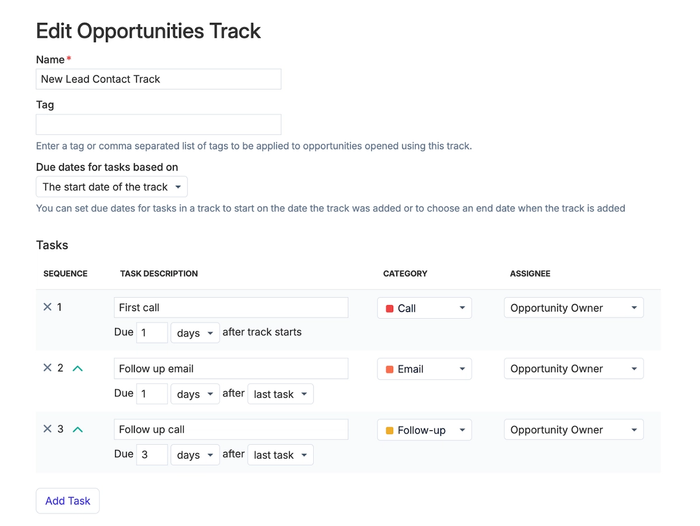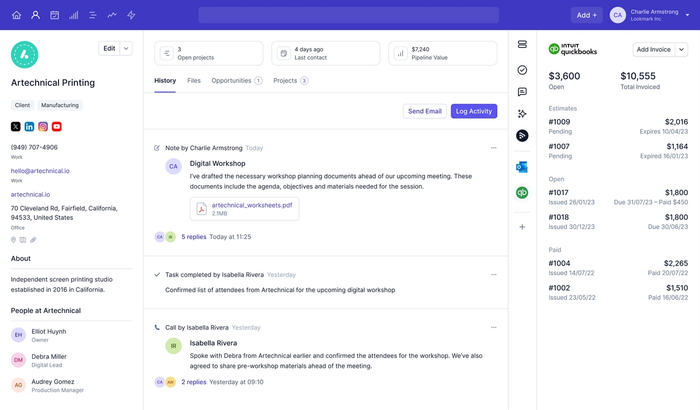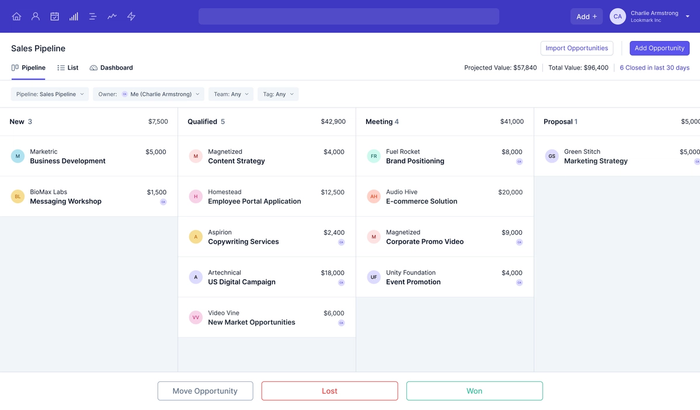If you’re reading this post, you probably already know a bit about the benefits of good CRM software. When it’s working correctly, a CRM transforms the way you and your team engage with customers.
Unfortunately, it’s not always smooth sailing. Rather than saving you time, a CRM can end up feeling like yet another system to manage that doesn’t seem to live up to its promises.
These challenges aren’t anything new, but they’re not inevitable either. With the right setup and strategies, a CRM can become one of the most useful systems in your business.
In this post, we’ll walk through five of the most common CRM challenges small businesses face and show you how to solve them, step by step.
1. Data quality issues
The only thing worse than no data is unreliable data. Maybe you’re trying to import your data into your CRM from a spreadsheet and things aren’t quite lining up. Before you know it, your contact data is either duplicated, incorrect, or missing entirely.
If your team can’t trust what’s in the CRM, they’ll start trying to work around it, making decisions based on guesswork and intuition rather than facts. As a result, you could easily end up wasting resources on poor-fit prospects or letting perfect customers slip through the cracks.
How to overcome it
Data quality problems are common, but by having a clear structure in place, you can avoid them becoming an issue. The key is to think in advance about how you’ll add data, both during the initial setup and on a daily basis.
- Prepare your data. Make sure you’ve got all your information correct and ready before beginning. Whether importing from a spreadsheet or another CRM, ensure all your headings and fields are standardized. Add any missing details and remove any duplicates.
- Create data entry guidelines. Decide how you’ll enter data so that it’s in the same format each time. Make internal guidelines for your team to confirm everyone adds data in the same way.
- Audit your data. Schedule regular check-ins to review your data and clean up any outdated records.
- Make ownership clear. Define (and document) who’s responsible for maintaining clean data in shared pipelines or team inboxes.
How Capsule helps
Capsule is designed to keep your data clean and usable from day one without overwhelming you with admin. Smart import tools let you map columns to fields and preview any changes so you can spot potential problems before they go live.
Automatic duplicate detection flags contacts with the same name or email so you can review them and take appropriate action. Meanwhile, you can use Tags, DataTags, and Custom Fields to organize contacts in the best way for your business.
2. Overwhelming task lists
A good CRM should help keep your work organized. Unfortunately, each new contact and deal typically means more tasks. If those tasks aren’t laid out and prioritized, it’s easy to lose track of what matters most.
Many people’s task lists are just a dumping ground for random reminders and vague actions that no one will actually follow up on. As a result, your team spends more time managing tasks while important leads go cold.
How to overcome it
To stop your CRM from becoming a task list terror, you need a structure that supports focus.
- Group tasks by category. Use labels (e.g. “Follow-up”, “Call”, “Meeting”, etc.) to put similar task types together, so they’re easier to filter and you can tackle them more efficiently.
- Prioritize tasks by urgency or impact. Use your CRM’s Calendar function to assign tasks in order of priority, so your team knows what’s truly important each day.
- Create repeatable workflows. Review your common processes (like sending a proposal or onboarding a new client) and write a Standard Operating Procedure (SOP) so you always know what to do next.
- Assign ownership. Every task should have one person who’s responsible for carrying it out.
How Capsule helps
Capsule gives you the tools to keep your task list lean, clear, and actionable. Task categories let you quickly sort your tasks and focus on making consistent progress. Tracks allow you to build repeatable workflows that kick in when a contact reaches a certain stage or at other milestones.

If you’re on the Growth plan or above, you can use Tracks with Workflow Automation to automatically tackle repetitive tasks. As a result, your team can spend more time building client relationships and other high-touch activities.
3. Onboarding new team members
When someone joins your team, they’re already learning a lot. They need to get to know your products, your process, and your culture. If the CRM feels like yet another confusing system to figure out, it can slow everything down.
If your CRM system is too complicated, new team members might end up missing the important details they need to close a deal.
How to overcome it
Get people up to speed quickly with an intuitive and process-driven CRM system.
- Use real examples for training. Walk through live contacts or deals so that new hires can see the system in action, not just in a sandbox.
- Provide context. Make sure contact and deal histories are visible so no one has to guess what’s already been done.
- Offer lightweight onboarding materials. Share short how-to videos or written walkthroughs tailored to your team’s workflows.
- Introduce usage in stages. Don’t overwhelm new users with every feature at once. Start with just the core tools (like contacts, deals, and tasks) and introduce advanced features later.
How Capsule helps
Capsule makes onboarding new users simple. The clean, intuitive interface means there’s almost no learning curve. New users can start using the system right away. Each contact and deal includes a full history of notes, emails, tasks, and files, so new team members have all the context they need.

Pipelines and Tracks give structure to your processes, while task assignments help clarify who’s doing what. If you need a helping hand, Capsule’s built-in guides and customer support make it easy to get answers fast.
4. Inconsistent sales processes
A successful sales process shouldn’t depend on who’s running it. However, in many small businesses, each team member handles sales a little differently. For every person who follows up religiously, another skips stages or carries them out in a different order.
Without a consistent process, things fall apart fast. You can’t reliably measure performance, forecast revenue, or optimize your processes. For small businesses looking to grow, inconsistent sales processes hurt their potential to grow.
How to overcome it
Building a consistent, repeatable sales process helps teams stay aligned and close more deals.
- Define clear stages. Map out the natural steps your team follows when turning a lead into a customer. Avoid vague labels like “In progress”. Instead, use specific, actionable stage names (e.g., “Proposal sent”) that reflect what’s actually happening.
- Standardize next actions. For every pipeline stage, define what needs to happen next. That might be a follow-up call, a demo, or a contract review.
- Use automation for consistency. Use your CRM to trigger automatic tasks or reminders as deals move forward. That way, no matter who’s managing the deal, the process stays consistent.
- Review regularly. Set a monthly or quarterly rhythm to review how deals are flowing. Are stages being skipped? Are deals stalling in one area? Use that data to adjust and improve.
How Capsule helps
Capsule makes it easy to build and maintain a consistent sales process. You can create custom pipelines that match your exact stages, while the visual drag-and-drop board makes it simple to manage your progress.

As we’ve seen, Tracks let you automatically assign tasks and actions as a deal progresses. Capsule’s Sales Analytics tools also help you monitor performance and identify where deals stall. Because pipelines are simple to edit, you can keep improving your process as your business grows.
5. Low user adoption
Even with a smooth onboarding process, just having the best CRM isn’t a guarantee that anyone will keep using it. Low adoption is one of the most common (and most frustrating) problems small businesses face with CRM systems. You invest time and money into setting it up, only to find your team still working out of spreadsheets. Pretty soon, your CRM stops being your single source of truth and instead feels like an expensive address book.
Low adoption usually comes down to one of three things: the system feels too complex, it doesn’t fit into daily workflows, or no one’s clear on why it matters. When either of those things happens, the CRM’s benefits vanish.
How to overcome it
Encouraging adoption means removing friction and showing value quickly, making the CRM feel genuinely helpful in everyday work.
- Choose a CRM built for everyday users. Avoid overcomplicated systems that require lots of training or customization. Your team needs something that makes their work easier, without them needing a computer science degree.
- Show quick wins. Demonstrate how the CRM helps in real situations, whether that’s prompting reps to follow up or showing them complete customer history for improved personalization.
- Make it part of daily routines. Build the CRM into how your team already works. Integrate it with email tools, calendars, and your team’s other favorite tools.
- Keep reinforcing best practices. Adoption isn’t a one-off task. Keep it front of mind with ongoing training and periodic reviews of how the CRM is helping the team hit their goals.
How Capsule helps
Capsule is designed to remove the common barriers that stop teams from using a CRM consistently. Its clean, user-friendly layout makes it easy for teams to stick with, even as your processes evolve. Everyday tasks, like logging emails, updating deals, or checking your to-do list are fast and intuitive.
Integrations with Gmail, Outlook, and other tools help Capsule fit naturally into daily workflows, reducing the need for extra clicks or duplicate work. Because it’s easy to maintain, your team stays engaged, without needing constant reminders. It becomes a helpful daily companion, not just another tool to remember.
A simple but powerful CRM for a smoother, stronger business
Every CRM challenge in this post is fixable. Whatever challenge you're dealing with, the key is to focus on the fundamentals: clean information, clear processes, and tools that actually work the way your team does.
The good news? You don’t need an enterprise budget or an expensive CRM consultant to get there.
Capsule is designed to help small businesses overcome these common pain points without the complexity. It’s simple to set up, easy to use, and flexible enough to grow with you. From day one, it helps your team stay organized, connected, and focused on what really matters: building strong customer relationships and closing more deals.
Ready to make your CRM work for you? Try any Capsule plan free for 14 days and see how it can simplify your sales.




